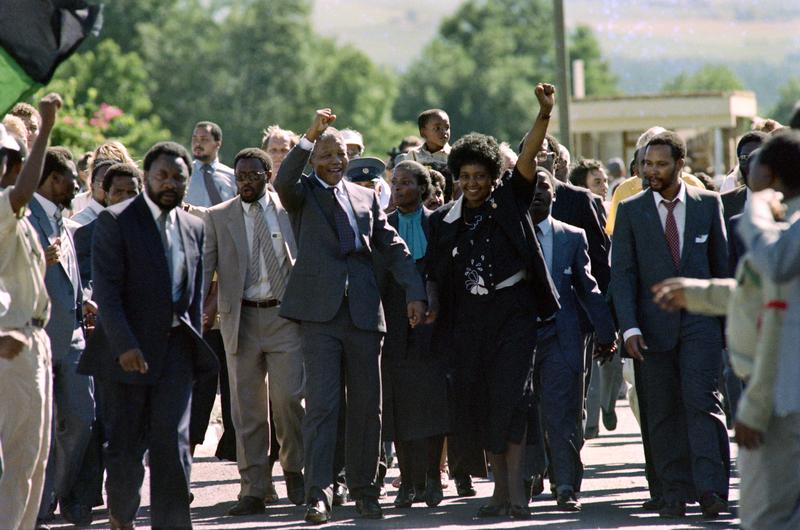
- Select a language for the TTS:
- UK English Female
- UK English Male
- US English Female
- US English Male
- Australian Female
- Australian Male
- Language selected: (auto detect) - EN
Play all audios:
We all know and steer clear of the deliberately offensive words used to insult and humiliate people of African descent. But what words should you use if you wish to be, if not PC, at least
respectful, non-controversial and bang on trend? Linguistic fashion, moral and intellectual, changes so fast it is hard to keep up. And who wants a barrage of trolling, online abuse for
getting it wrong? Since my school and university days in the States I’ve been fascinated by the sensitive topic of virtue signalling and the language of race. But now it is a matter of
current import. I am writing my memoirs and have just reached 1958 when, as a schoolboy, I first spent time with Thurgood Marshall, probably the greatest civil rights leader America
produced. How to refer to the people he represented? I consulted my daughter, a branding guru who has lived and worked between New York and London for the past two decades, about current
usage. Go for “people of colour”, she said. Ok. Marshall was the first “person of colour” (Ugh, what a phrase) to be appointed to the Supreme Court. President Johnson, a Southerner,
nominated him in 1966. A brave thing to do. For Marshall was the man who, as head of the venerable National Association for the Advancement of Coloured People, persuaded that same court to
take the revolutionary step of outlawing school segregation in 1954. That sparked a decade or more of struggle, usually non-violent, to enforce civil rights, and murderous resistance to the
campaigns by white racists. Marshall was a hate figure to most Southern white voters. Here I must digress. A jigger is a small metal vessel used by bar persons (ugh again) to measure a
portion of spirit. In much of America you order a jigger of whisky as we in Britain might order a single or a shot. The relevance of this will now become apparent: I sat next to Marshall at
a small dinner party, in an amazing apartment overlooking Central Park. It was thrown by one of New York’s multi-millionaire liberal Democrat families. We hit it off and Marshall quietly
told me a joke about a Southerner who turned up with a friend in a bar in progressive Greenwich Village and ordered two jiggers of whisky. The barman looked at him with contempt. “You’d
wanna be served, you better order again, Redneck. Up here we call them jegroes.” Marshall’s point was that in northern circles, Negro had become a chosen term of respect. But when the NAACP
was set up in 1909 the founders had chosen “coloured people” because they found “Negro” patronising. Marshall died in 1983, so he was not to know that by the millennium, “coloured people”
had somehow been deemed unspeakably offensive. The clunking “people of colour” had become more than acceptable. Heaven knows what the logic of that was. It could as easily have been the
other way round. “Black” has had an even more chequered history. In the 50s and 60s and beyond it became the description of choice for militant groups. Black Muslims. Black Panthers. Even
the Black Jews of Chicago, who thought they were the Lost Tribe of Israel and so had prior claim to the Holy land over those we usually think of as Jewish. White folk were divided about
calling people “Black”. The more radical used “Black” as a term of friendship. Others used it with a bit of a sneer. I was one of the former group. But the last time I was in NYC, some 15
years ago, my black friends were definitely unhappy when I used the word. Then there is “Afro-American” and its spin-off “African-American”. The former was perfectly acceptable in the 1980s
and 1990s. Encouraged even. But suddenly it fell out of favour, replaced by “African American.” When I used the “Afro” form in 2002 I got a severe ticking off from a rather smart, middle
class black chum. I’ll finish with a story which is too good to be true, but I love it. “African American” was the prescribed form for PC network presenters when Nelson Mandela took his
televised long walk to freedom from jail. As he walked alone down that lonely road, the young presenter excitedly introduced him as “Nelson Mandela: the leader of South Africa’s African
American community.” None of which leads to any conclusion; except perhaps that, on the language of race, you can easily be too PC for your own good. It’s a logic-free zone, fraught with
danger. Watch your tongue.






